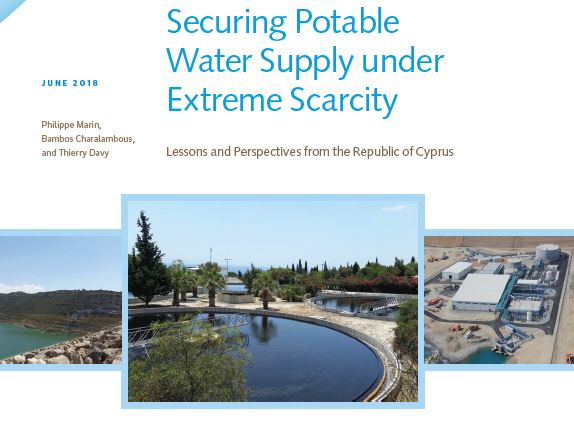Securing Potable Water Supply under Extreme Scarcity Lessons and Perspectives from the Republic of Cyprus
The Republic of Cyprus is one of the most water-scarce countries in the world, with only 390 m3 per capita of utilizable freshwater on average every year (government-controlled areas). It is also, along with Malta, one of the two “water poor” countries of Europe. The negative impact of global climate change can already be felt acutely, with a 20 percent reduction in average rainfall since the early 1970s. Historically and in the absence of any perennial rivers, the island has relied essentially on groundwater to meet potable water and irrigation demand. Growing population during the 20th century led to the overexploitation of aquifers, with saline intrusion in coastal areas. Following the independence from UK in 1960, a massive dam development program was carried out under the motto “not a drop of water to the sea.” Over three decades, more than a hundred dams (of which 56 were large dams) were built in the central Troodos Mountains, providing a total storage capacity of 332 million cubic meters and making Cyprus the European country with the largest number of dams per capita. The 2008–09 drought demonstrated that massive recourse to seawater desalination rainwater was a must for Cyprus to achieve potable water security in the face of high rainfall variability, growing demand, and climate change. Two other large desalination plants were put into operation under BOT schemes in 2012 and 2013, to reinforce supply in the western part of the Southern Conveyor (especially for Limassol). The four desalination plants are all connected to the Southern Conveyor, with a total production capacity of 220,000 m3 /day—sufficient to supply all the potable water needs of the Nicosia, Larnaca, Limassol, and Famagusta areas even during peak summer months. A fifth desalination plant is to be put in operation in 2018–19 in the city of Paphos, on the western coast. Over the past two decades, Cyprus has developed a solid expertise in the development and supervision of desalination BOTs, with well-designed contracts including various operational modes (standard, standby, additional volume) and flexible concessionaire fees’ structure—allowing the WDD to optimize production based on demand. The contractual price (standard operating mode) for desalinated water is in the range of 0.70 to 0.90 euros/m3 , and the private sector has financed close to 250 million euros for the desalination plants’ construction. Despite these worthy successes, Cyprus faces several important remaining challenges for reforms—in order to move toward fully sustainable water management. Most of the efforts so far have been focused on the “supply side” of water policies (increasing capacity for water storage and desalination), and several aspects of water management (especially with regard to financial sustainability and operational efficiency) remain to be optimized. The analysis in this report has allowed for the identification of four priority pillars for potential future policy actions.
